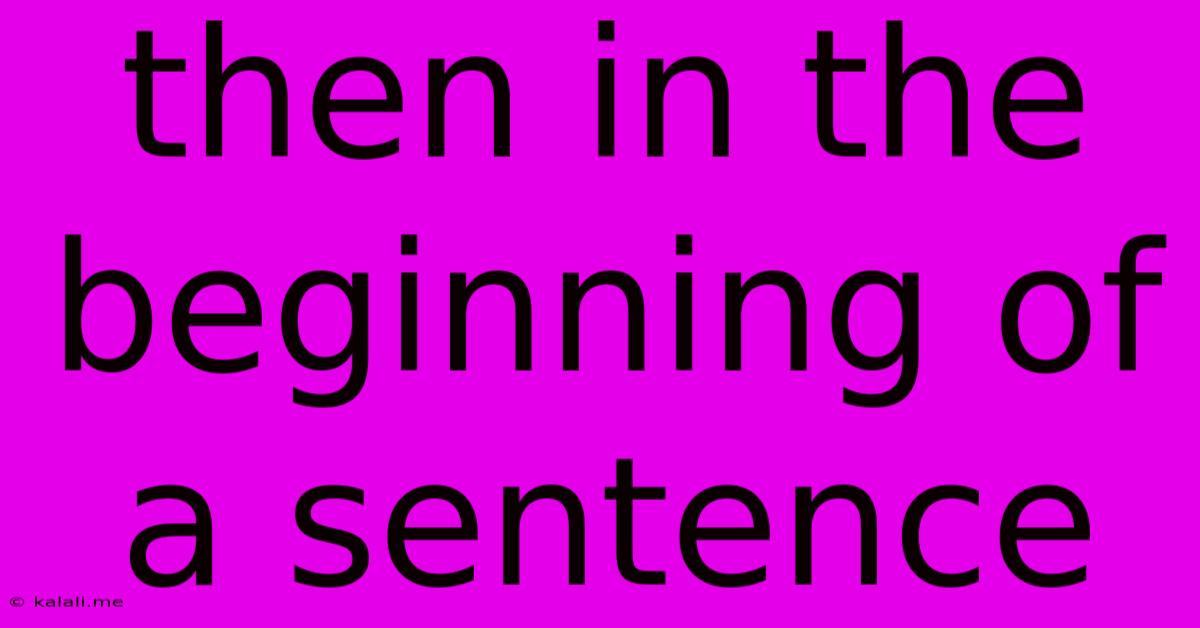Then In The Beginning Of A Sentence
Kalali
May 31, 2025 · 3 min read

Table of Contents
The Power of "Then" at the Beginning of a Sentence: Crafting Engaging and Flowing Prose
Beginning a sentence with "then" might seem like a stylistic faux pas, a grammatical taboo whispered about in hushed tones in English classrooms. However, mastering the art of using "then" at the sentence's start can significantly enhance your writing's flow, create suspense, and add a touch of sophistication. This article explores the effective and nuanced use of "then" to elevate your writing. This guide covers various contexts and offers practical examples to help you confidently employ this often-underutilized word.
Understanding the Nuances of "Then"
"Then" is an adverb indicating time or sequence. Its primary function is to show what happens next in a chronological order. However, its placement at the beginning of a sentence shifts its role slightly, adding a subtle yet impactful emphasis on the ensuing action or event. It establishes a clear causal link between preceding sentences, improving the text's coherence and readability. Effective use hinges on carefully considering context and sentence structure.
Effective Uses of "Then" at the Sentence Start
-
Showcasing Causality and Consequence: This is perhaps the most common and effective use. "Then" clearly signals that the following action is a direct result of what's been previously described.
- Example: "The rain started to fall heavily. Then, the streets quickly became flooded." Here, the flooding is a direct consequence of the heavy rain.
-
Creating a Sense of Progression and Narrative Flow: In storytelling or descriptive writing, "then" guides the reader smoothly through the sequence of events, preventing abrupt transitions and maintaining narrative momentum.
- Example: "She woke up to the sound of birds chirping. Then, she made herself a cup of coffee and sat down to read." This creates a natural flow, making the narrative easy to follow.
-
Adding Emphasis and Dramatic Effect: By placing "then" at the beginning, you draw attention to the subsequent clause, creating a slight pause for emphasis.
- Example: "He waited anxiously for the results. Then, silence." The short, impactful sentence following "then" heightens the dramatic effect of the situation.
-
Establishing Logical Connections in Argumentative Writing: "Then" can smoothly connect arguments or supporting points, creating a logical and persuasive flow.
- Example: "The study showed a strong correlation between exercise and improved mood. Then, we can conclude that regular physical activity contributes to better mental health." This establishes a clear causal link between the evidence and the conclusion.
When to Avoid Starting with "Then"
While "then" can be a powerful tool, overuse can lead to monotonous and repetitive writing. Avoid starting consecutive sentences with "then" as this can make your writing sound choppy and predictable. Vary your sentence structure to maintain reader engagement. Furthermore, in formal writing, overuse might be perceived as slightly informal.
Mastering the Art of "Then"
The effective use of "then" at the beginning of a sentence depends on context and purpose. Careful consideration of the preceding and following sentences ensures its smooth integration. By using "then" strategically, you can create a more engaging and coherent narrative, strengthening the impact of your writing. Remember that variety is key; don't overuse it, but don't shy away from its power to enhance your prose. Practice is key to mastering its use and integrating it seamlessly into your writing style.
Latest Posts
Latest Posts
-
How Long Do Scallops Last In The Fridge
Jun 02, 2025
-
How Many Power Armors Are In Fallout 4
Jun 02, 2025
-
What Does It Mean When Sampling Is Done Without Replacement
Jun 02, 2025
-
How To Remove Labels On Wine Bottles
Jun 02, 2025
-
How To Backfeed A Generator To Your House
Jun 02, 2025
Related Post
Thank you for visiting our website which covers about Then In The Beginning Of A Sentence . We hope the information provided has been useful to you. Feel free to contact us if you have any questions or need further assistance. See you next time and don't miss to bookmark.